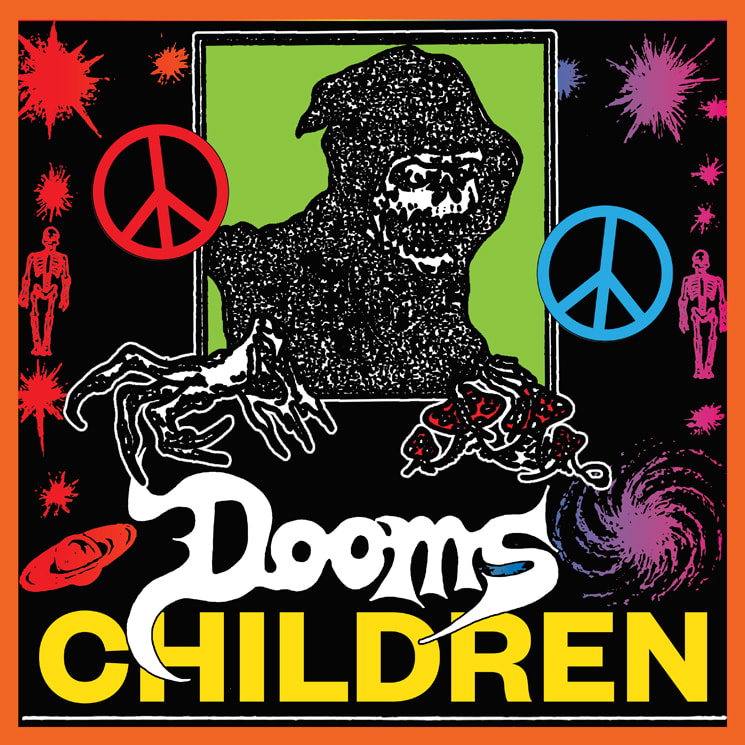With the self-titled debut album of his new psych rock project Dooms Children, post-hardcore old salt Wade MacNeil is sonically nostalgic — nostalgic for a time in music when pioneer bands like Grateful Dead (there's even a cover of "Friend of the Devil"), Blue Cheer and the Zombies dominated the charts. Through this trippy wistfulness and his grizzled, raw voice, MacNeil has managed to create one of his most personal works to date, a harmonious grimoire that never loses its lustre.
On Dooms Children, MacNeil opens the door to the murky marrow of rock'n'roll as its many themes line up with some of the most vulnerable points of his life. There are songs about the sorrows that come with lost love, battling addiction and intimate misgivings. Musically, MacNeil utilizes an arsenal of instrumental techniques — along with guest musicianship and co-production from the prolific Daniel Romano — to give the whole record a retro feel.
MacNeil is clearly wearing his musical influences on his sleeve, though it comes off more as reinvigorated punk rock devotion than cheap homage. The opening phaser arpeggios and slide guitar on "Flower Moon" brings to mind a soft rock epic like Lynyrd Skynyrd's "Tuesday's Gone" before slowly morphing into a heavier garage Black Sabbath number, right down to the devil-horned Tony Iommi lead guitar tone. For a moniker like Dooms Children, there isn't too much heavy sludge on the LP — hazy, sun-drenched jams like "Skeleton Beach" or "Morningstar" are more the norm — but when MacNeil does decide to crank up the intensity, like during the outro of "Lotus Eater," the creeping headbangs ensue.
The lyrics are also surprisingly tender, such as the brutally honest opening lines on "Psyche Hospital Blues": "My father cried when he dropped me off at rehab" / Caused so much pain, I didn't even know / In that instant, the world felt smaller." Then there's "Heavy Year" that, with lyrics like "It's been a heavy year in retrospect," could go down as the Canadian pandemic anthem, though is more of a more personal form of catharsis for MacNeil, opening with the lines "In the iron weeks that passed since my mother's death / We all grieved in our own way."
This isn't the first time we've experienced a vulnerable MacNeil — he's responsible for many of the heavy, angst-ridden Alexisonfire and later Gallows narratives — but with Dooms Children, there's no vague cloak over the lyricism; it's just him chronicling his story over a 20-year career. Call it a psychedelic-toned autobiography from a man who has experienced the best and worst life has to offer.
On Dooms Children, MacNeil opens the door to the murky marrow of rock'n'roll as its many themes line up with some of the most vulnerable points of his life. There are songs about the sorrows that come with lost love, battling addiction and intimate misgivings. Musically, MacNeil utilizes an arsenal of instrumental techniques — along with guest musicianship and co-production from the prolific Daniel Romano — to give the whole record a retro feel.
MacNeil is clearly wearing his musical influences on his sleeve, though it comes off more as reinvigorated punk rock devotion than cheap homage. The opening phaser arpeggios and slide guitar on "Flower Moon" brings to mind a soft rock epic like Lynyrd Skynyrd's "Tuesday's Gone" before slowly morphing into a heavier garage Black Sabbath number, right down to the devil-horned Tony Iommi lead guitar tone. For a moniker like Dooms Children, there isn't too much heavy sludge on the LP — hazy, sun-drenched jams like "Skeleton Beach" or "Morningstar" are more the norm — but when MacNeil does decide to crank up the intensity, like during the outro of "Lotus Eater," the creeping headbangs ensue.
The lyrics are also surprisingly tender, such as the brutally honest opening lines on "Psyche Hospital Blues": "My father cried when he dropped me off at rehab" / Caused so much pain, I didn't even know / In that instant, the world felt smaller." Then there's "Heavy Year" that, with lyrics like "It's been a heavy year in retrospect," could go down as the Canadian pandemic anthem, though is more of a more personal form of catharsis for MacNeil, opening with the lines "In the iron weeks that passed since my mother's death / We all grieved in our own way."
This isn't the first time we've experienced a vulnerable MacNeil — he's responsible for many of the heavy, angst-ridden Alexisonfire and later Gallows narratives — but with Dooms Children, there's no vague cloak over the lyricism; it's just him chronicling his story over a 20-year career. Call it a psychedelic-toned autobiography from a man who has experienced the best and worst life has to offer.




